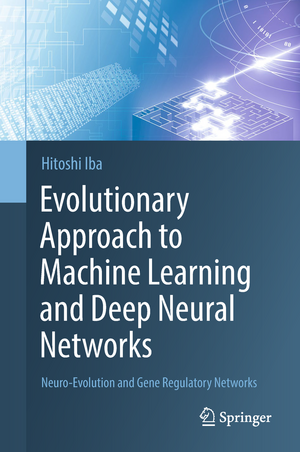Evolutionary Approach to Machine Learning and Deep Neural Networks: Neuro-Evolution and Gene Regulatory Networks
Autor Hitoshi Ibaen Limba Engleză Hardback – 26 iun 2018
The last chapter is dedicated to the state of the art in gene regulatory network (GRN) research as one of the most interesting and active research fields. The author describes an evolving reaction network, which expands the neuro-evolution methodology to produce a type of genetic network suitable for biochemical systems and has succeeded in designing genetic circuits in synthetic biology. The author also presents real-world GRN application to several artificial intelligent tasks, proposing a framework of motion generation by GRNs (MONGERN), which evolves GRNs to operate a real humanoid robot.
| Toate formatele și edițiile | Preț | Express |
|---|---|---|
| Paperback (1) | 988.32 lei 6-8 săpt. | |
| Springer Nature Singapore – feb 2019 | 988.32 lei 6-8 săpt. | |
| Hardback (1) | 992.15 lei 6-8 săpt. | |
| Springer Nature Singapore – 26 iun 2018 | 992.15 lei 6-8 săpt. |
Preț: 992.15 lei
Preț vechi: 1240.18 lei
-20% Nou
Puncte Express: 1488
Preț estimativ în valută:
189.84€ • 198.75$ • 157.09£
189.84€ • 198.75$ • 157.09£
Carte tipărită la comandă
Livrare economică 05-19 aprilie
Preluare comenzi: 021 569.72.76
Specificații
ISBN-13: 9789811301995
ISBN-10: 9811301999
Pagini: 260
Ilustrații: XIII, 245 p. 127 illus., 84 illus. in color.
Dimensiuni: 155 x 235 mm
Greutate: 0.56 kg
Ediția:1st ed. 2018
Editura: Springer Nature Singapore
Colecția Springer
Locul publicării:Singapore, Singapore
ISBN-10: 9811301999
Pagini: 260
Ilustrații: XIII, 245 p. 127 illus., 84 illus. in color.
Dimensiuni: 155 x 235 mm
Greutate: 0.56 kg
Ediția:1st ed. 2018
Editura: Springer Nature Singapore
Colecția Springer
Locul publicării:Singapore, Singapore
Cuprins
Introduction.- Meta-heuristics, machine learning and deep learning methods.- Evolutionary approach to deep learning.- Machine learning approach to evolutionary computation.- Evolutionary approach to gene regulatory networks.- Conclusion.
Recenzii
“The main aim of this work is to present and elaborate the bridge between theoretical approaches and the concrete, real-life challenges in genetics. … the author's efforts to present these concepts in an accessible manner brings the edge of research within the reach of a wider audience. The examples and the algebraic formalism throughout, augmented by the relevant references … open this field to undergraduates, postgraduates and established researchers alike and provide a solid starting point to more progressive research.” (Irina Ioana Mohorianu, zbMATH 1394.68003, 2018)
Notă biografică
Hitoshi Iba received his Ph.D. degree from The University of Tokyo, Japan, in 1990. From 1990 to 1998, he was with the Electro Technical Laboratory (ETL) in Ibaraki, Japan. He has been with The University of Tokyo since 1998 and is currently a professor at the Graduate School of Information and Communication Engineering there. His research interests include evolutionary computation, genetic programming, bioinformatics, foundations of artificial intelligence, artificial life, complex systems, and robotics.
Textul de pe ultima copertă
This book provides theoretical and practical knowledge about a methodology for evolutionary algorithm-based search strategy with the integration of several machine learning and deep learning techniques. These include convolutional neural networks, Gröbner bases, relevance vector machines, transfer learning, bagging and boosting methods, clustering techniques (affinity propagation), and belief networks, among others. The development of such tools contributes to better optimizing methodologies. Beginning with the essentials of evolutionary algorithms and covering interdisciplinary research topics, the contents of this book are valuable for different classes of readers: novice, intermediate, and also expert readers from related fields.
Following the chapters on introduction and basic methods, Chapter 3 details a new research direction, i.e., neuro-evolution, an evolutionary method for the generation of deep neural networks, and also describes how evolutionary methods are extended in combination with machine learning techniques. Chapter 4 includes novel methods such as particle swarm optimization based on affinity propagation (PSOAP), and transfer learning for differential evolution (TRADE), another machine learning approach for extending differential evolution.
The last chapter is dedicated to the state of the art in gene regulatory network (GRN) research as one of the most interesting and active research fields. The author describes an evolving reaction network, which expands the neuro-evolution methodology to produce a type of genetic network suitable for biochemical systems and has succeeded in designing genetic circuits in synthetic biology. The author also presents real-world GRN application to several artificial intelligent tasks, proposing a framework of motion generation by GRNs (MONGERN), which evolves GRNs to operate a real humanoid robot.
The last chapter is dedicated to the state of the art in gene regulatory network (GRN) research as one of the most interesting and active research fields. The author describes an evolving reaction network, which expands the neuro-evolution methodology to produce a type of genetic network suitable for biochemical systems and has succeeded in designing genetic circuits in synthetic biology. The author also presents real-world GRN application to several artificial intelligent tasks, proposing a framework of motion generation by GRNs (MONGERN), which evolves GRNs to operate a real humanoid robot.
Caracteristici
Begins with the essentials of evolutionary algorithms and covers state-of-the-art research methodologies in the field as well as growing research trends Presents concepts to promote and facilitate effective research in evolutionary algorithm approaches both in theory and in practice Inspires readers to explore the rapidly developing fields of artificial intelligence and evolutionary algorithms, actively introducing research topics in those areas
